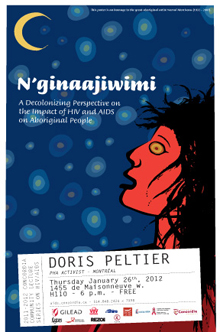Talking about HIV
For the 19th consecutive year, a quartet of artists, scholars, experts is bringing their unique perspectives on the HIV/AIDS pandemic to Concordia.
This month, the Concordia University Community Lecture Series on HIV/AIDS kicks off with speaker Alex Juhasz, an activist, media studies professor and filmmaker who began memorializing friends who lost their lives to AIDS in 1980s.

As a member of ACT-UP, she used video to address stigma, judgment and media indifference in the early years of the pandemic. Now a professor at Pitzer College in Los Angeles County, she has written several books on documentary, feminist media and activism. She will speak on the Internet’s role in the fight against HIV/AIDS.
When: Thursday, October 13 at 6 p.m.
Where: Room H-110, Henry F. Hall Building (1455 De Maisonneuve Blvd. W.)
In addition to her lecture, she will be giving a master class to a select group of students the following afternoon.
This is the first of four lectures by people representing different communities, countries, linguistic groups, professions and knowledge of HIV infection. This broad range of experience has been a hallmark of the speaker series for almost two decades.
“We’re particularly proud of the strong speakers we have had representing the arts,” says Thomas Waugh, director of the university’s HIV/AIDS project, among them are singer Diamanda Galás, dancer Margie Gillis and filmmaker John Greyson.

Waugh, a professor at the Mel Hoppenheim School of Cinema, began the lecture series to accompany a class on HIV/AIDS. “This became the flagship course for Concordia’s interdisciplinary program in sexuality studies.” The course provides an overview of medical, cultural, scientific and social aspects of the pandemic.
“There was a period in the late ’90s when we thought that maybe we didn’t need this series anymore,” recalls Waugh, who holds the Concordia University Research Chair in Documentary Film and in Sexual Representation. “In the West, we now had anti-retrovirals and HIV infection was ostensibly becoming a manageable chronic condition.”
However, it was the experiences of those in other parts of the world that underscored the need to continue the program. “If anything, the crisis is getting worse in Eastern Europe, Africa and Latin America,” explains Waugh.
Vinh-Kim Nguyen, slated to speak in November, is a physician and medical anthropologist who has worked with people living with HIV in West Africa.
In the winter term, Doris Peltier and Barry Adam will address HIV infection in Canada. Peltier will discuss her experience as an Aboriginal woman living with HIV while Adam offers a sociological perspective on AIDS organizing and prevention campaigns.
Over the years, different issues have become priorities in Canada. While treatment is accessible, Waugh says the conservative government’s efforts to criminalize HIV transmission remain a major concern for students living with the virus.
Related links:
• 2011-12 Concordia University Community Lecture Series on HIV/AIDS
• Thomas Waugh
• Mel Hoppenheim School of Cinema
• Interdisciplinary Studies in Sexuality